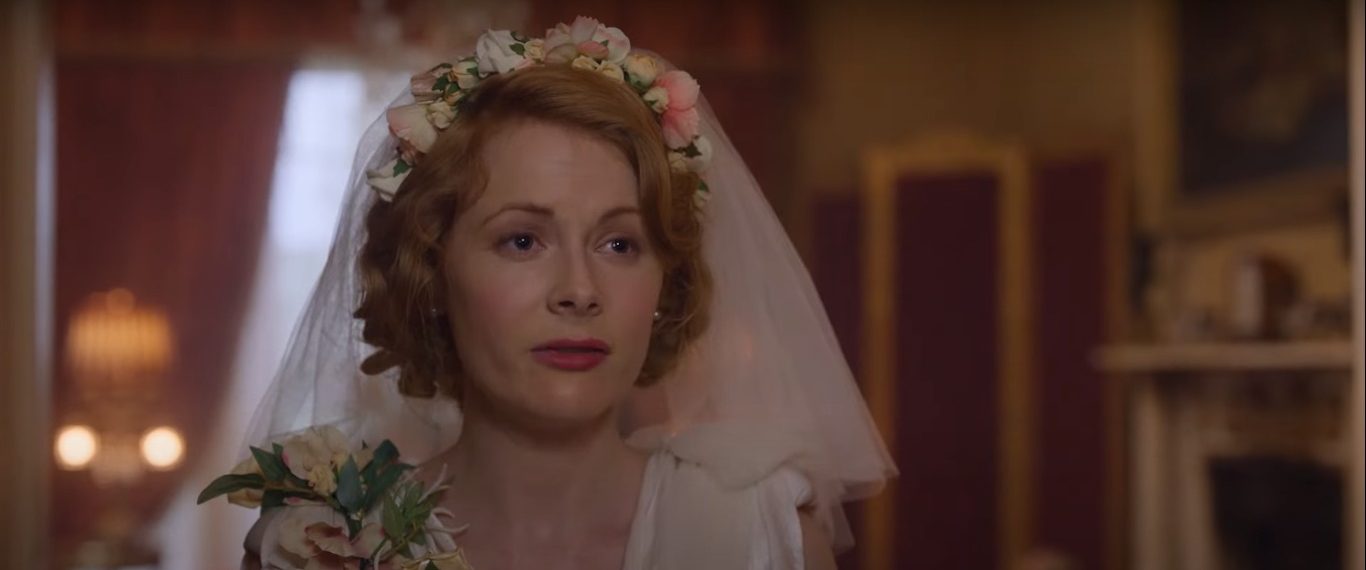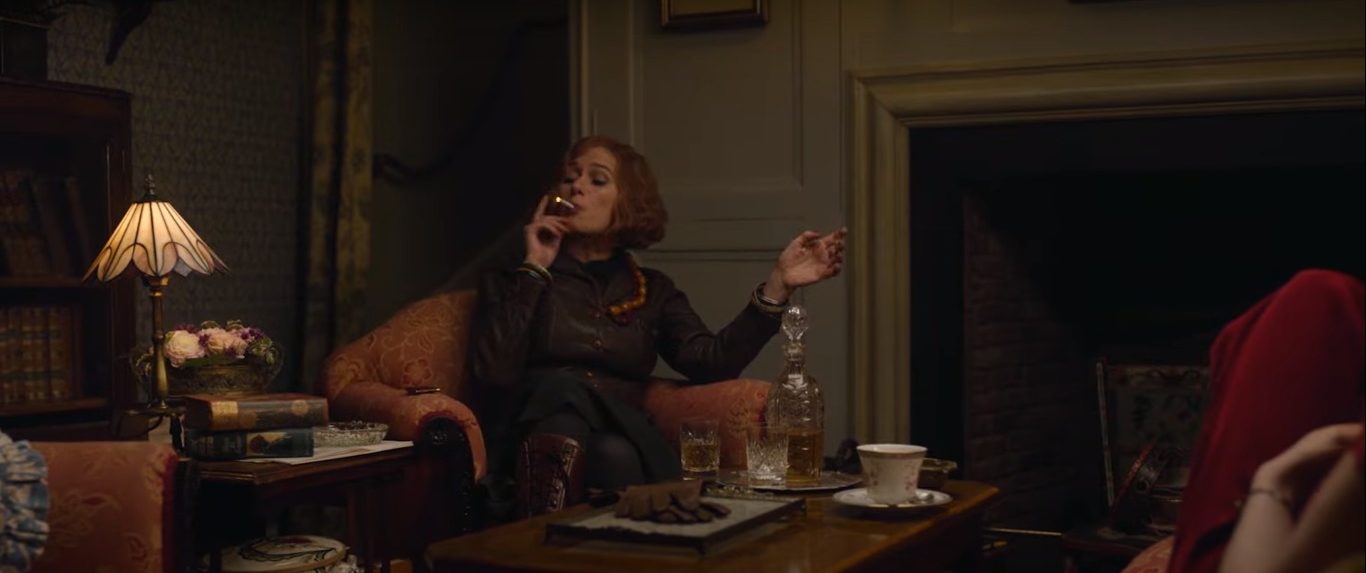‘The Pursuit of Love’ is a British period drama based on the 1945 novel of the same name by Nancy Mitford. The miniseries follows the lives of two cousins, Linda and Fanny, as they navigate the eccentricities of British high society and love during the interwar period. The story is layered and emotional, with the two central characters following drastically different approaches to life whilst being each other’s closest confidants. A number of complex dynamics are explored, and we are made privy to an intricate web of relationships that include a truly remarkable range of characters. If you’re left with some questions at the end of the 3-part miniseries, worry not. We’re here to untangle them and help uncover the subtleties of Fanny and Linda’s inextricable journeys. SPOILERS AHEAD.
The Pursuit of Love Recap
The story opens with Fanny, who is also the narrator, going to pick up her pregnant cousin Linda after the latter’s London apartment is destroyed during a German air raid. The two make their way to Alconleigh, Linda’s sprawling family home, where the rest of her family has taken refuge from the war. Fanny then begins to describe their childhood together, of which she has fond memories, especially of Christmas, which she spent at Alconleigh with her “favorite human being and cousin.”

Linda is dramatic and a hopeless romantic who feels even more caged due to her overbearing father, Matthew, who is alarmingly xenophobic and insists on keeping his daughters uneducated. He even chides Fanny for attending school and blames her whenever Linda gets into trouble. Through all their ups and downs during childhood and into adulthood, Linda and Fanny remain each other’s closest confidantes and dream of having adventures and finding the men of their dreams.
Linda is highly taken with their flamboyant neighbor Lord Merlin, who introduces her to Tony Kroesig, a dashing Oxford student who is the son of the governor of the Bank of England. Despite her father’s violent refusal (due to Tony’s German heritage), Linda insists on marrying him but soon finds herself trapped in an even more suffocating world of conservative, high-society snobbishness. She also remains cold and distant to her first daughter, Moira, and soon leaves Tony in favor of a broke but dynamic socialist named Christian.

Meanwhile, Fanny marries a level-headed Oxford Don and enjoys the bliss of a happy and content domestic life. She is, however, repeatedly alarmed by Linda’s wild flights of fancy that seem to be dragging her down financially. At a new year’s eve party, Fanny finds Linda living in a tiny apartment with not enough money for food but celebrating along with a bunch of communists nonetheless.
When the Spanish War breaks out, Linda rushes to Christian’s side on the French-Spanish border. However, she finds how unprepared she is to cope with the real world, given her lack of education. She soon leaves Christian, but having run out of money, finds herself stranded in Paris, where she is rescued by a wealthy Baron named Fabrice De Sauveterre. Linda is immediately enchanted with him and becomes his mistress, living in an apartment he has bought for her and waiting every day for him to come to visit. This is how Fanny, Lord Merlin, and Captain Davey, who come looking for her, find Linda.
The Pursuit of Love Ending: Does Linda Die? Is She Reunited With Fabrice?
Despite her cousin imploring her, Linda chooses to stay back in Paris because she finds Fabrice a refreshing change from the men from her past. However, the swiftly advancing war soon forces her to move back to London, where Fabrice visits her and finally professes his love. Linda is ecstatic and decides to wait in London for Fabrice to return from the war, despite the situation getting increasingly dangerous. Eventually, her apartment is bombed, and she returns to Alconleigh with Fanny.

Fanny and Linda then spend their pregnancy together in the family home, reminiscing about their childhood and ruminating about how they are back where they started. Both their babies are born on the same day, but Linda dies at childbirth. The closing scenes of the miniseries show a brokenhearted Radlett family taking her newborn son in, who Fanny names Fabrice.
Linda’s heartbreaking romance doesn’t quite end as she pictured it. After looking for the love of her life ever since she learned about the concept as a child, Linda’s time with Fabrice is heartbreakingly short. She risks her life living in London during the war, waiting for his call, and only leaves when her apartment is destroyed. Even back at Alconleigh, she doesn’t give up hope and waits faithfully for Fabrice. Despite what her family says and Fabrice’s own reputation, the Frenchman does seem to have truly fallen in love with Linda as well.
Unfortunately, Linda passes away due to complications at childbirth, something doctors had warned her about during her first pregnancy. Though not explicitly stated, Linda most likely goes ahead with the pregnancy despite knowing the dangers so as to bring into the world a symbol of her and Fabrice’s love. Her reason for always remaining cold towards her first daughter, Moira, was Linda’s absolute loathing for her first husband Tony and his vainglorious family. Therefore, it seems to follow that she would truly want a baby with Fabrice, who is the love of her life.

Fabrice, too, is killed soon after Linda’s death. He is captured by the German Gestapo and shot. Despite never being reunited with Fabrice, Linda mentions to Fanny that she should write a book about her (Linda’s) happy ending. Therefore, our romantic leading lady seems to have achieved what seems like one of her biggest lifelong yearnings — to find a man who is the love of her life. She seems content having achieved that and, as Fanny says, dies happy.
What Happens to Linda’s Baby?
Linda’s baby, born on the same days as Fanny’s, is adopted by the latter. The grieving cousin has to get permission from Christian, who is the child’s legal guardian, as Linda never officially gets divorced from him. Fanny names Linda’s baby Fabrice after his father and claims that the young boy has the enchanting eyes of his mother and that she loves him possibly more than she loves her own son.
Did Lord Merlin Love Linda? Why Does He Repeatedly Help Her?
Lord Merlin is an enigmatic figure that is occasionally seen and takes center stage whenever he is. Responsible for introducing Linda to the world of art and literature, he is one of the few people (apart from Captain Davey) who recognizes the hopeless romantic in her and celebrates it. Though he and Linda never get intimate, Lord Merlin seems to have a surprisingly personal stake in her love life and reacts emotionally every time Linda picks a man who he says is wrong for her.

Interestingly, he turns out to be right on both occasions, first about Tony and then Christian. During Linda’s marriage with the latter, as she struggles financially, he gives her a charming apartment in London so she can have her freedom without having to live in squalor. It seems like Lord Merlin doesn’t love Linda as much as he reveres her. Being a passionate patron of all forms of art (with pink and blue-dyed pigeons fluttering around his eclectic mansion), he recognizes the burning need in her for dramatic romances and is the only one who understands the arguably self-destructive path she follows.
Despite Lord Merlin not always approving of her actions, he never once tries to control her. He is also responsible for turning Linda into a wild socialite in her youth, where she spends years of her life drinking and chatting with fashionable young men— something she dreamed of doing as a little girl. In the end, after Linda’s death, Lord Merlin is seen picking up and taking away her beloved French bulldog Pon Pon, which seems highly poetic.
Was The Bolter Right All Along?
Fanny’s mother (essayed by the show’s writer and director Emily Mortimer) is notoriously footloose and is seen with a host of men of varying nationalities and persuasions throughout the show. In the end, engaged to a Spaniard with whom she has never spoken (since the two don’t have a language in common), she seems to have forgotten whether she divorced her previous husband and revels in the joys of skipping from man to man. In a fine example of British wit, she is widely referred to as “Bolter” for her tendency to flee from any situation that threatens to tie her down. In the early parts of the story, we see her repeatedly leave young Fanny to go off with different men, for which she seems never to show remorse even when confronted by her daughter.

So epic is Bolter’s reputation that her nickname is often used to describe a trait in a person. When Linda eventually starts embarking on her own wild adventures, parallels between her and Bolter begin to be drawn. However, when Fanny hints to her cousin that she might be becoming like Bolter, Linda is alarmed. Bolter is the person that let Fanny down all her life, and Linda, despite her fickle nature, is loath to think of herself like that.
The central dilemma of the show is whether it is better to throw caution to the wind and chase experiences or live a controlled life within the bounds of social expectation. Linda follows the first path, and Fanny picks the second. Since they share the goal of attaining happiness in their romantic relationships, the audience is shown how effective each of these strategies is compared to the other. Fanny is convinced that Linda’s life is exciting while she wastes away in a predictable marriage, and Linda lauds Fanny’s bravery for settling down and berates herself for not sticking to one thing. At one point, Linda even regrets leaving her vain husband Tony, whom she hated.
In the end, Bolter solves the mystery. In the show’s closing scenes, she reveals to Fanny that despite having enjoyed her constant freedom and not having to be answerable to men, such a life has not been kind to her in her old age. She says that it is just as well that Linda, after her string of whirlwind romances, died while still young. The women then burst into laughter, and it seems that despite their opposing views on the matter, they have finally realized that there is no good path to a long and happy life.
A life of footloose frenzy, as Bolter says, is best if ended early, while a long and content life requires missing out on some of life’s adventures. The latter is clearly seen in Fanny’s character, who, a few years on from Linda’s death, seems more content than ever to sit in her garden surrounded by her children a few years on from Linda’s death.
Read More: Is The Pursuit of Love a True Story?


You must be logged in to post a comment.